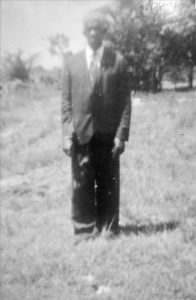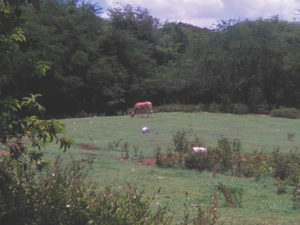Even with the new emphasis on handwashing, some people can’t wait to get their hands dirty again.
farming
island notebook
That Was Our Tonic
A grandfather’s resourcefulness and its rewards

Elmas Gustauvos Bowlin — or Dadda Bowlin — was a man respected by the entire community for his resourcefulness and way of life, and he was my own hero and mentor. I can still remember standing next to him as he met with Jamaica’s fourth prime minister, Michael Manley.
Traditionally, most Jamaicans have a nickname or two, but my granddad was Dadda Bowlin for all family members and Mr. Bowlin for everyone else, no exceptions. He was a man who lived proudly and simply, and who relied heavily on the land around him. Our backyard was never short of eggs, milk, meat birds, goats, or pigs, or a wide variety of vegetables and fruit.
There were five different houses on the property, and with all the cousins, aunts, and uncles it was a tight race early each morning to get to our fruit trees of choice. And we had the birds’ beaks, craving sweet fruits, to contend with. All when dih bud dem start nyam it, wih still pick dem and nyam it (Even if the birds had begun, we would still pick it from the tree and eat it).

The sweet sap of sugar apple and custard apple was my favorite. Dadda Bowlin’s was bumpy bananas. He never had to race with the others — everyone stayed clear of the boss man’s prize. And as for the birds: he secured special ventilated bags over each bunch of fruit, denying them access. Principle and discipline were never in short supply.
It was during our two-week project of making charcoal that his patience and tenacity were most remarkable.
First, the way my grandfather selected and then cut the trees was painfully slow. We would follow him as he navigated his way deep into the morass, where he pointed out each tree he wanted us to tag. As always, he would give us a strong warning not to cut any tree that wasn’t tagged.
It occurs to me now that my grandfather’s approach to logging was dramatically different from that of the British, back when they governed Jamaica. I’ve heard it said that they would go into a kind of feeding frenzy in the wetlands on both sides of the Black River, cutting any and every size tree to use in various kinds of manufacturing. Though it was the logwood tree that brought the most wealth to the Black River community, because of the demand for its dye in England.
But back to the charcoal: as my brothers and I made our way to the heart of the thick terrain, carrying an axe and a few machetes, it seemed to me as if we were being trained as soldiers without guns (Comin laka seh wih a train fih ton soldjah wih dout guns).
Wading through mud, cutting trees and hauling logs back, I would think something like, Dadda ah kill wih wid wok on him naah mek nuff money offah the coal (Granddad is killing us all with this work, and he is not making a lot of money from the coal). But what I hear him saying now, and always in English, is, “If it puts bread on the table, it’s worth getting out of bed to do.”
Next came the part I had the least patience for: the tedious process of constructing the perfect hill of firewood, each piece meticulously chosen and placed. And my grandfather’s instructions seemed to grow more and more technical with each step.
After completing the hill, we covered it with a thick layer of hay. If Dadda Bowlin approved, then it was time to cover the whole thing with dirt, while saving a special hole in the top to start the fire.
The beauty of all that hard work, I see now, was that there was always more food on the table than you could eat. Along with the special drink my grandfather made from a blend of wild herbs.
After boiling the herbs slowly for a few days, and then adding honey from his bees, he would pour it into glass bottles he let sit in a cool dark shed to ferment. Dat deh a did fih wih tonic (That was our tonic).
